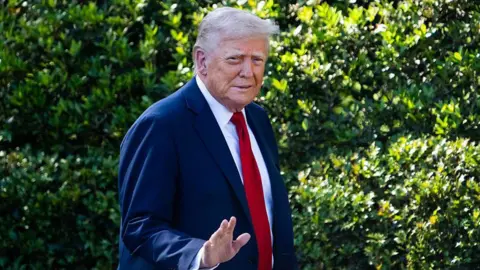President Donald Trump is making headlines with an announcement intended to diminish the effects of tariffs impacting American car manufacturers. According to a prominent official from the White House, the President’s latest policies are poised to significantly aid the US automotive sector, which has faced challenges due to previously imposed trade tariffs. Commerce Secretary Howard Lutnick shared insights regarding this initiative, proclaiming it a pivotal victory for the President’s trade agenda, emphasizing that the plan rewards companies that produce vehicles on American soil.
In this new directive, President Trump is expected to unveil measures aimed at reducing import duties on parts sourced from outside the United States, which are integrated into vehicles manufactured domestically. While cars that are produced overseas will still be subject to automotive tariffs, some reports indicate that these vehicles may be exempt from additional levies. This strategic adjustment is likely to provide some relief to automotive manufacturers grappling with the financial implications of these tariffs.
The timing of this announcement coincides with President Trump’s rally scheduled in Michigan, a significant event marking his first 100 days in office. Michigan holds a special place in the automotive landscape of the United States, being home to the so-called “Detroit Three”: Ford, General Motors (GM), and Stellantis. This region hosts an extensive network of over 1,000 crucial suppliers that support the car manufacturing industry, making it a focal point for any discussions pertaining to automotive policy.
Following the announcement of the tariff adjustments, GM’s Chief Executive Officer, Mary Barra, expressed her gratitude towards President Trump for his ongoing support of the American automotive industry and the millions of employees who rely on this sector. In a statement to the BBC, she acknowledged the productive dialogues that had taken place between the automaker and the Trump administration, emphasizing a commitment to furthering collaboration in the future. However, responses from the other major players, Ford and Stellantis, were not immediately available, indicating they have yet to publicly weigh in on the new tariff measures.
In prior weeks, industry groups representing the US automotive sector had expressed their concerns to the President about the imposition of 25% tariffs on imported car parts. A coalition, including prominent manufacturers like GM, Toyota, and Volkswagen, emphasized that these tariffs could lead to increased prices for consumers, reduced sales at dealerships, and heightened costs associated with vehicle servicing and repairs. Such feedback highlights the potential backlash from the automotive sector if these tariffs were to be enforced without adjustments.
President Trump had previously highlighted that these tariffs were slated to come into effect on May 3, putting additional pressure on a crucial industry that employs millions and forms an essential part of the American economy. Given the measures indicated to be introduced, it appears that the administration is attempting to strike a balance between protecting domestic manufacturing and preventing further financial strain on an industry under transformative technological and economic pressures.
In summary, by easing certain tariffs while maintaining others, the Trump administration aims to bolster the domestic car manufacturers and address the legitimate concerns raised by industry leaders. Now, as the President prepares for a significant rally in Michigan showcasing his policies, the response from the automotive industry and consumer organizations will likely have wide-ranging repercussions on future trade and economic policies.



